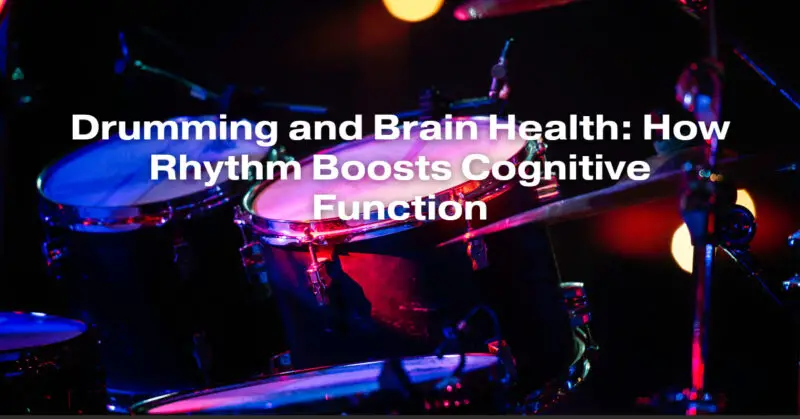Rhythm is not only a fundamental element of music but also a powerful tool for enhancing brain health and cognitive function. “Drumming and Brain Health: How Rhythm Boosts Cognitive Function” explores the fascinating relationship between drumming and the brain. Whether you’re a drummer, a music enthusiast, or someone interested in cognitive well-being, this guide will take you on a rhythmic journey into the science behind the beat and its profound effects on the mind.
1. The Rhythmic Brain Connection
- The Power of Rhythm: Understand how rhythm engages the brain and influences various cognitive processes.
- Neuroscience of Drumming: Explore the neurological basis of rhythm perception and production.
2. Cognitive Benefits of Drumming
- Memory Enhancement: Discover how drumming can improve memory recall and retention.
- Attention and Focus: Learn how rhythm aids in sharpening attention and concentration skills.
3. Stress Reduction and Emotional Well-Being
- Stress Relief: Explore how drumming acts as a natural stress reliever, reducing cortisol levels and promoting relaxation.
- Emotional Expression: Understand how rhythm allows individuals to express emotions non-verbally.
4. Motor Skills and Coordination
- Fine Motor Skills: Learn how drumming enhances fine motor skills and hand-eye coordination.
- Limb Independence: Discover the challenges and rewards of mastering limb independence in drumming.
5. Cognitive Rehabilitation and Therapy
- Rhythmic Therapy: Explore the use of drumming in cognitive rehabilitation for individuals with neurological disorders.
- Drumming for Mental Health: Understand how drumming therapy can benefit individuals dealing with anxiety, depression, and trauma.
6. The Ageless Brain
- Drumming and Aging: Investigate how drumming can support cognitive health in older adults.
- Dementia and Alzheimer’s: Explore the potential of rhythm-based interventions in dementia care.
7. The Rhythms of Learning
- Educational Impact: Discover how drumming programs in schools can enhance cognitive development and academic performance.
8. The Science of Groove
- Groove and Brain Synchronization: Explore the brain’s synchronization with musical groove and its impact on mood and motivation.
9. Drumming as Therapy
- Drum Circles: Learn about the therapeutic benefits of group drumming and community engagement.
10. Getting Started with Drumming
- Drumming Basics: Get introduced to basic drumming techniques and rhythms.
11. Incorporating Drumming into Daily Life
- Home Practice: Discover ways to integrate drumming into your daily routine for cognitive well-being.
12. Drumming Resources
- Online Lessons and Communities: Find resources and communities for drummers and individuals interested in the cognitive benefits of drumming.
Conclusion
“Drumming and Brain Health: How Rhythm Boosts Cognitive Function” invites you to harness the power of rhythm to enhance your cognitive abilities and overall well-being. Whether you’re drumming for stress relief, memory enhancement, or the sheer joy of rhythm, this guide illuminates the scientific and therapeutic dimensions of drumming. So, pick up your drumsticks, embrace the beat, and embark on a rhythmic journey that not only elevates your music but also nourishes your mind and brain.

